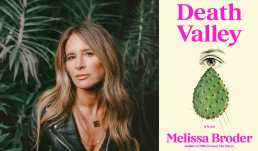Independent booksellers across the country have chosen Melissa Broder's Death Valley (Scribner) as their top pick for the October 2023 Indie Next List.
In Death Valley, a woman takes to the desert to escape her grief only to become lost on a hike.
“A hike becomes a metaphysical journey straight into the center of grief, featuring literature’s most memorable cactus. Broder delivers us directly to the site of the wound and somehow makes us want to linger,” said Kristen Iskandrian of
Thank You Books in Birmingham, Alabama.
Here, Broder discusses her work with Bookselling This Week.
Bookselling This Week: You’ve talked about how the protagonist’s early struggles mirror your own a little. What were the challenges of writing this kind of autofiction?
Melissa Broder: I see Death Valley as more of a send-up of autofiction than actual autofiction. When I finished recording the audiobook, one of the audio techs asked, “Was this a true story?" and I said, "Yes, I entered a magic cactus and encountered my loved ones at different stages of their lives."
That being said, I began writing the novel while my father was in the ICU for six months following a car accident. So there are elements of the story that are drawn from my life. My father died as a result of complications from his injuries in May of 2021, and I went on writing for another year. The biggest challenge was not in writing a novel inspired by such a fresh wound, because I actually think it would have been harder for me not to write it. The biggest challenge was that once I finished the novel, I no longer had the daily connection to my father that the act of writing brought.
BTW: What inspired the more fantastical and survival elements of this story?
MB: While my father was in the ICU, I was experiencing anticipatory grief, though I didn’t know what that was at the time. I was trying to escape this feeling — driving back and forth through the desert between my home in L.A. and my sister's in Las Vegas. I was driving through Baker, CA, home of the world's largest thermometer, when an image came to me: a magic cactus where a protagonist, going through a similar grief journey, could go inside and encounter her father at various stages of his life.
Cacti are rugged, hearty, tough. I did not want to feel what I was feeling, and I think I longed to be a cactus at that time. Also, grief is a desert, in that we are as powerless over feelings as we are over nature. But there is beauty to be found in both: grief and the desert.
The survival elements began to develop when, during a later desert research trip, I got lost on a hike in Death Valley. I did everything wrong: no water, no phone service, no one aware of where I was. I was only lost for half an hour, but I did what you’re not supposed to do: I panicked. And I got all scraped up climbing a rockface trying to get back. But once I made it back to my car (and cried in the car) I was excited. Now I knew what had to happen in my novel. My protagonist was going to get lost in the desert. And she would get lost for longer than half an hour.
BTW: We spend a lot of time isolated with our main character and much of the story is our main character’s stream of consciousness. So we’re very close to the character as she shifts from internal to external struggles. Would you talk a little about creating and navigating a story like this?
MB: I'm a very internal person. Too internal. So it wasn't a challenge for me to draft a text that is so inwardly-situated. What was challenging was externalizing the narrative enough to keep the reader engaged. To do this, I gave voice to inanimate objects (talking rocks), animals (rabbits and a bighorn sheep), and interspersed flashback scenes with other characters in order to maintain narrative propulsion. I also incorporated a psychic by way of audiobook, interactive visions and dreams, and FaceTime.
BTW: Could you talk a little bit about the role of books and indie bookstores in your life?
MB: Growing up as an awkward adolescent and teen, I hid out in bookstores and libraries. They were loci of refuge, escape, excitement, revelation, and in a way, companionship. I'd grab a stack of books and hole up in some corner with candy — usually Jujyfruits. Nowadays I have more agency over my own life, but books still provide me with all of these necessary elements. Henry Hoke's
Open Throat excites me.
In a Lonely Place by Dorothy B. Hughes is an escape. My newest friends are May Sarton and Vigdis Hjorth. Especially May. And I will say this: as a writer since the age of eight, there is no greater thrill than walking into an indie bookstore and seeing my books on the shelves or on a table. It never, ever gets old. Never. It's the greatest.


